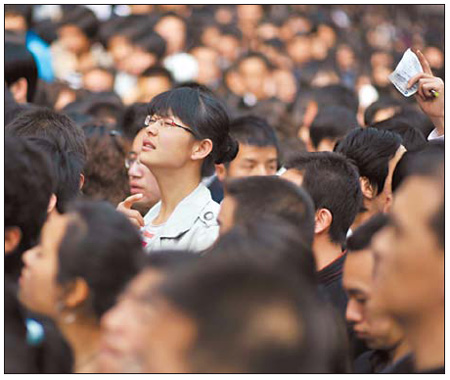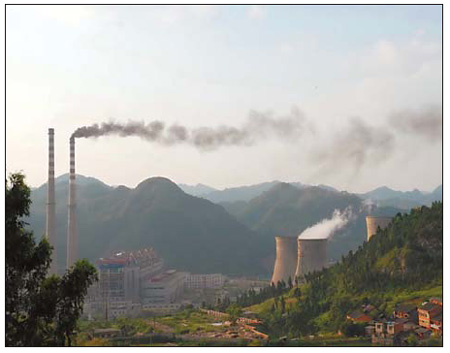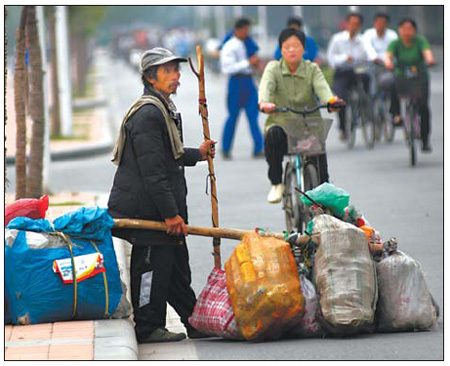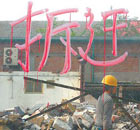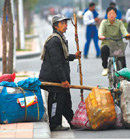Top Biz News
Growing costs
By Hu Yinan, Li Jing and Wang Shanshan (China Daily)
Updated: 2010-01-22 07:44
 |
Large Medium Small |
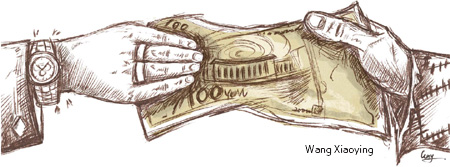
|
College graduates flood a job market in Lanzhou, capital of Gansu province, in the hope of winning one of the 4,000 positions on offer. The job market may be in recovery but unemployment also poses a real threat to the sustainability of China's economic growth, say experts. [China Daily] |
|
A power factory in the scenic city of Kaili, Guizhou province, emits black smoke every afternoon, causing heavy pollution. [China Daily] |
|
A garbage collector takes a break in Nanjing, capital of Jiangsu province. The wealth gap in China is growing in "all directions", between urban and rural residents, between those in eastern and western parts, and between people working in different industries. [China Daily] |
As China celebrates GDP success, Hu Yinan, Li Jing and Wang Shanshan look at the dilemmas and struggles facing one of the world's largest economies
Li Boren digs coal for a living. He has three brothers; two work alongside him and one was killed in a mine collapse. His father was a coal miner and his teenage son will probably end up working in the mines, too.
His ambition is to send his 16-year-old daughter back to school. She was once the top student in her class but had to quit three years ago because Li could not afford the tuition fees. Now his daughter spends her days looking after the family's two-room house in Sanmenxia, Henan province, which has no heating and few comforts.
Li has never left his village but the coal he and his coworkers have mined from its depths has reached every corner of China and fueled the country's explosion in gross domestic product (GDP).
Yet the announcement yesterday that could mean China has the world's second largest economy will have little effect on Li and his family.
Some sections of society have not benefited from the financial boom as much as others, and the growing wealth gap is described by analysts as the Sword of Damocles hanging over the economic giant. Also posing a danger is a deteriorating environment that has been sacrificed for GDP growth, and a high unemployment rate among young people.
"A nation's worst fear is that its poor lose hope in bettering themselves and instead feel despair. There is such a trend in our society," said Sun Liping, a sociology professor at Tsinghua University in Beijing.
The wealth gap is growing in "all directions", between urban and rural residents, between those in eastern and western parts, and between people working in different industries, said the Report on China's Population and Labor.
Published by the Chinese Academy of Social Sciences last October, the report showed the income disparity between rural and urban residents is 12 times greater now than a decade ago. The annual income of an urban resident was more than three times that of a rural one in 2007, academy research found.
A separate report released last October by the National Development and Reform Commission compared the highest earners with the lowest. It showed incomes among the top 10 percent were seven times that of those lowest 10 percent in 1988. By 2007, the gap had increased to 23 times.
Experts fear that children growing up in poverty may "inherit" their parents' position in society and feel a stronger sense of injustice than previous generations.
"We need to pay special attention to two groups of people: children of migrant workers and those of urban poor families," said Li Shi, a sociology professor at Beijing Normal University. "First-generation migrant workers do not have a strong pursuit of fairness. They think it good enough to leave the countryside, and their goal is to work hard and give their children a good education. The second generation is different.
"The second generation grows up in cities and adopt the value system of urban residents, but they also feel inferior in cities. There are many of them and they tend to connect, gather and be organized. They want to change the reality. Many are still at school but will join the labor market within five or 10 years."
Children in urban poor families, whose parents are low-paid workers or unemployed, may either receive less education or have difficulties in finding jobs after graduation. They are stuck at the bottom of society and eager for change, said Li.
The wealth gap has fueled many mass incidents in recent years, according to Zheng Gongcheng, a professor at Renmin University of China in Beijing. In a survey carried out in 11 provinces, he discovered 80 percent of the more than 4,000 respondents believe society is unfair.
The disparity could also hinder economic development in the future, analysts warned.
"A lot of the wealth is in the hands of a small number of people, so there cannot be a continuous growth in domestic consumption," said Mao Peihua, associate professor of economics at Shanghai University of Finance and Economics. "In this global economic environment, China needs domestic consumption to go on with its development."
Zhang Zhengxiang, a 61-year-old retired farmer in Yunnan province, has dedicated most of his life to a landmark that reflects possibly China's greatest development dilemma: GDP growth versus the environment.
Zhang lives close to Dianchi Lake in Kunming, the country's sixth largest freshwater lake. It was once regarded as the "pearl" of the Yunnan-Guizhou Plateau, famed for its crystal clear waters. Now, after years of industrial pollution, the lake is covered with a thick layer of blue algae and emits an unbearable odor.
"I became an orphan when I was seven years old. I once lived on fishing from Dianchi and I have always seen the lake as my mother. I want to give something back to her," said Zhang, who visits the lake every week to check the water quality.
But his passion to protect the once beautiful attraction had made him a troublemaker in the eyes of some people, especially the rogue factory bosses, illegal quarry owners and timber thieves he has been at war with since 1994.
Zhang has suffered for his efforts. He said he has received several threats from companies, while his wife and daughter left him after he went bankrupt filing lawsuits against polluters.
He has also discovered that one man cannot reverse the tide of environmental degradation caused by a massive industrial boom that started in the 1980s.
Almost a third of all the economic output of Yunnan - a largely impoverished province with a population of 44.5 million - is concentrated in the drainage area of Dianchi Lake, according to provincial authorities.
Before the first wastewater plant was built in 1990, Kunming used to pump 90 percent of its wastewater directly into the lake. Between the mid-1980s and mid-1990s, the water quality has deteriorated from the Grade 3 (safe to drink) to below Grade 5 (too dangerous for human contact).
The local government has since 2008 invested about 12 billion yuan ($1.7 billion) into cleaning up the lake. However, the water is not expected to return to its former glory until 2020, by which time more than 100 billion yuan will have been spent by authorities to remove the pollution, said Li Kunmin, director of the city's Dianchi Lake management bureau.
Dianchi Lake epitomizes the cost China's rapid development and economic growth: Environmental and ecological deterioration.
The country's economy has expanded on average 9.7 percent every year for three decades. The rate of growth has forced China to deal with the kind of environmental woes industrialized countries once faced, only over a shorter period of time. Developed countries began addressing ecological concerns when their per capita GDP reached $20,000, but China must now achieve the same results when its per capital GDP is only about $3,000, environment officials said.
Faced with mounting challenges in recent years, the central government is determined that green growth is the only way to ensure future prosperity. As Zhou Shengxian, the environment minister, put it: "It is a disgraceful lifestyle to drive a BMW but have only dirty water to drink."
The success in imbuing the green growth concept in the minds of local government officials will determine whether China can solve its development dilemma.
To prevent the nation's economy from suffering further from the global financial crisis, local authorities are once again blindly pushing through polluting projects rather than fueling "green GDP".
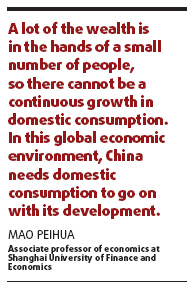
A pilot project to calculate green GDP - a system designed to gauge real economic growth by deducting the cost of environmental pollution - was conducted in 2005 by the Ministry of Environmental Protection (then-State Environmental Protection Administration) and National Statistics Bureau.
The findings were released the following year and showed environmental damage had cost the nation almost 512 billion yuan in 2004, about 3 percent of that year's GDP.
No subsequent reports have been released and analysts say this is because local governments are opposed to the publication of disappointing results.
Nobel Prize-winning economist Joseph Stiglitz recently called on people to "get away from GDP fetishism and to understand the limits of it". GDP alone is insufficient in truly measuring a country's economic health and sustainability, while human wellbeing must be considered, he said.
Unemployment also poses another threat to the sustainability of China's economic growth.
Manufacturing industries in coastal regions have started to pick up the pieces and the country is well on its way to becoming the world's largest exporter. But overseas demand for Chinese products is far from the pre-financial crisis levels and many people, especially among the nation's 225 million migrant workers, have struggled to find work.
At the beginning of last year, it was reported that 20 million migrant workers were left out of work due to the economic slowdown.
There is no official figure available to the exact number of people unemployed in China but the State Council has vowed to keep the registered unemployment rate below 4.6 percent this year - the highest since 1980.
A report published by the Chinese Academy of Social Sciences in late 2008 predicted registered unemployment could hit 10 percent last year. But through series of policy incentives and investment, the country limited the rate to 4.3 percent as of September, slightly higher than in 2008, said Yin Weimin, minister of Human Resources and Social Security.
China's export industry can no longer create the same number of jobs it did before the economic crisis, say analysts, and the country has been forced to find ways to boost domestic consumption.
Many of the migrant workers who were laid off last spring have already returned to the job market and eased concerns about a potential labor shortage, said Li Peilin, director of the academy's institute of sociology.
However, Niu Dao, a real estate expert with cnstock.com, insisted the situation could be more daunting than what labor officials say.
"Between January and October last year, power consumption by the light manufacturing industry experienced a year-on-year fall of 1.9 percent, according to figures from the National Energy Administration," said Niu. "That translated into a lack of contracts on the part of these enterprises and fairly accurately reflected the real employment conditions."
Most new loans made by Chinese banks last year went to the coal, power and transport sector, with the real economy not receiving much in comparison, Niu argued, citing figures released by the National Development and Reform Commission.
"At least 80 million migrant workers are employed in the light manufacturing industry. A drop in the industry's power consumption means people lose their jobs. I estimate around 31 million people were in fact jobless as of last October," he said.
| ||||
A scandal involving a university that faked a job contract for a student to push up its employment rate also knocked confidence in the country's job market. High employment rates for new graduates help promote colleges, but it has discovered some were manipulating their figures by making out contracts for jobs that did not exist. At the time, the government had placed jobless college graduates atop its agenda.
